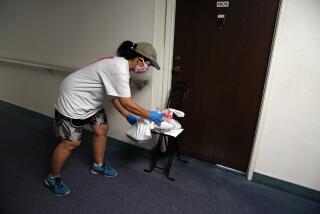Seeking a solution to wasted food
Sometimes it’s hard to do good. For example, donating leftover banquet food to charity.
Shirley Wei Sher, a Marina del Rey immigration lawyer, discovered how challenging this can be when she recently tried to prevent leftovers at an upcoming meeting of the Southern California Chinese Lawyers Assn. from being thrown away.
Sher, 33, sits on the board of the organization and is helping plan the group’s annual awards banquet at a Chinatown restaurant next month. As many as 1,000 people are expected to attend.
In past years, Sher told me, enough leftovers to feed maybe 100 people ended up in the dumpster. She found this disconcerting, especially at a time when so many individuals and families are in need.
So she Googled “food donations” and came up with columns I’ve written on the subject. That’s how she learned about a federal law that shields food donors from legal liability.
Sher contacted the Union Rescue Mission in downtown Los Angeles, which provides food and shelter to hundreds of skid row denizens. She explained about the banquet and asked if the mission would be willing to receive any leftovers.
The answer, surprisingly, was no.
“They were concerned about violating the local health code,” Sher recalled. “When I explained about the federal law, they said it was trumped by the health code.”
I heard the same when I spoke with the Rev. Andy Bales, chief executive of Union Rescue Mission.
“If we took food that made our guests sick, we could lose our right to keep our kitchen open,” he said. “That would be devastating.”
So how does this square with the Emerson Good Samaritan Food Donation Act, which was passed in 1996? It’s supposed to protect individuals and organizations from civil and criminal liability when food is donated to a nonprofit group.
But Bales pointed to a fine-print provision of the law specifying that no part of the federal rule “shall be construed to supersede state or local health regulations.”
“We interpret that as meaning that the local code comes first,” he said.
Bales is correct. Even though a federal law would typically mean that state statutes or local ordinances take a back seat, the Good Samaritan law was crafted to ensure that local food-safety rules are followed.
“Just because people are poor, they shouldn’t be subjected to food that no one else would eat,” said Fred Pritzker, a Minneapolis lawyer who specializes in food-safety issues.
But what about the intent of the law — to facilitate the donation of food to the needy? Doesn’t giving local health codes predominance undermine the federal law’s blanket protection from liability, thus making donation of food, and especially prepared food, an enormous risk?
“It’s blanket protection for food that is prepared safely,” said Bill Marler, a Seattle lawyer who, like Pritzker, is also a prominent food-safety specialist. “It’s not blanket protection for food that’s been shoveled out of the dumpster.”
The Good Samaritan law does shield well-meaning donors from legal problems, Marler and Pritzker agreed, so people like Sher would have little to fear. However, the lawyers said, the risk of serving tainted food can’t be avoided by charities that receive the donation.
Simply put, if a charity can’t ensure that donated food met local safety standards throughout its preparation, presentation and later storage, the organization could be on the hook for any issues that arose after serving the food to its own population.
In the case of Sher’s offer to the Union Rescue Mission, Bales said, it would be impossible to know for sure that local rules for temperature control and storage were followed every step of the way.
“We serve 2,400 meals every day,” he said. “We couldn’t afford to have our kitchen closed down because of something like this.”
Does this mean prepared food can never be donated to the those in need? No.
The trick, Marler and Pritzker said, is to create procedures that mitigate a charity’s risk. For example, a nonprofit group could be formed specifically to pick up, store and transport leftovers from hotels and restaurants at regular intervals.
That nonprofit, working with local health authorities, would be in a position to ensure that safety standards are met and thus would be able to demonstrate that all parties are acting in good faith — the central tenet of the Good Samaritan law.
Angelica Pappas, a spokeswoman for the California Restaurant Assn., said her group would be interested in working with a qualified nonprofit that could assist in food donations. “It’s something we’re exploring,” she said.
Roughly 1.5 million tons of food is thrown out each year by California caterers, hotels and restaurants, according to the state Integrated Waste Management Board.
Meanwhile, 3.7 million adults statewide struggled to put food on the table in 2009, the latest year for which numbers are available from the California Health Interview Survey, conducted by the UCLA Center for Health Policy Research.
So props to Sher and the Southern California Chinese Lawyers Assn. for wanting to do right by others, and props to Union Rescue Mission for making sure that the food it serves people is safe.
There are solutions to the enormous amount of food wasted annually. But it will take a concerted effort by all concerned to remedy the problem.
Seems to me it’s an effort worth making.
David Lazarus’ column runs Tuesdays and Fridays. He also can be seen daily on KTLA-TV Channel 5 and followed on Twitter @Davidlaz. Send your tips or feedback to [email protected].
More to Read
Inside the business of entertainment
The Wide Shot brings you news, analysis and insights on everything from streaming wars to production — and what it all means for the future.
You may occasionally receive promotional content from the Los Angeles Times.











